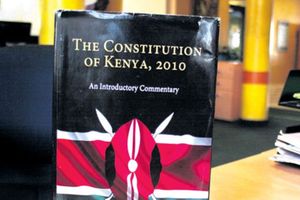
To build the enabling environment for green industrialisation to thrive, regulatory frameworks that direct and guide the business environment must be at the core.
A few years ago, Kenya’s Green Economy Strategy was launched as part of Vision 2030. The aim was to integrate environmental considerations into economic planning and development, emphasizing the need for policies that support green technologies and innovations.
The collaboration between government entities and private sector under this framework was crucial for driving investments in green industries, ultimately leading to job creation and sustainable economic development.
Fundamentally, for any economic growth to be realised, and to build the enabling environment for green industrialisation to thrive, regulatory frameworks that direct and guide the business environment must be at the core. Last week we examined the first of three challenges to such economic growth - Corruption. This week, we shift our focus to a crucial pillar of progress: the importance of functioning regulatory agencies.
Regulatory agencies play a crucial role in any economy. They oversee all sectors to ensure compliance with laws and regulations and provide operational predictability for entrepreneurs, thereby protecting public interests. Regulatory agencies are the heartbeat of any economy.
The guardians of public trust, establishing standards that set the benchmark for excellence across industries. In a world where trust is in short supply, regulatory agencies ensure that our economic environment remains strong, vibrant and competitive.
I can’t help but think that in the final analysis, regulatory agencies are the all-important bridge among the legislative, executive, and judicial branches of government, facilitating the implementation of laws while balancing accountability, integrity and independence.
Stifle growth
In Kenya, thus far, the report card is not great. It is simply not easy to do business here. Ask any entrepreneur. From setting up to becoming fully operational, entrepreneurs face numerous hurdles that stifle growth and innovation. That's what we want to unpack today as we consider the ways in which this further retards economic progress.
Regulatory agencies and policies have a major and direct impact on the business environment and their actions and decisions affect entrepreneurs, like Cecilia. Let us place ourselves in her shoes, as someone who has invested heavily in setting up her manufacturing facility and is ready to engage in green industrialisation through manufacturing bamboo products.
One of the characteristics of an enabling environment for businesses to thrive is the ease of establishing and registering a business. So what does Cecilia’s journey look like? For starters, Cecilia would need no less than eight licenses and permits, each with their own administration and fees, and acquiring them is not as straightforward. If we want to incentivise entrepreneurship, we must remove the smoke and mirrors associated with setting up in Kenya and agree that the process must be smooth and simple enough to draw people and not repel them.
A clear example is the One Stop Centre at Kenya Invest whose stated purpose is ‘to ensure efficient and effective facilitation of the implementation of new investment proposals and cost-effective operations of existing investments and businesses’. Yet even this is not a complete service as it does not include crucial permits and licenses at county government levels that Cecilia would need.
One energy investor shared that it took him seven years to acquire all the necessary permits to begin operations, as he refused to “facilitate” the process. This is unfortunately not an isolated experience and is an expensive cost for any business. You can imagine the frustration!
Despite the Kenyan government’s enthusiasm and commitment to adopt fairly comprehensive digital systems, such as the E-Citizen platform, the fact is regulatory bodies and their systems are neither integrated nor streamlined.
There are overlapping mandates housed and executed by a number of different regulatory bodies, a level of confusion which makes it difficult for entrepreneurs to manoeuvre and ensure they do not fall foul of the system.
Mandatory systems
Whilst not denying the need to have clear and mandatory systems in place to both enable and protect the business environment, we cannot at the same time become encumbered by the over-regulation and bureaucracy that exists today. It is choking innovation and economic growth. One could argue this is by design. For example, what happened to the comprehensive plans laid out in Vision 2030 and similar projects, with clear mandates? Was it necessary to abandon them?
Kenya stands at a crossroads, where the potential for inclusive transformation is overshadowed by systemic challenges. While we have functional systems and processes in place, they are often circumvented by a lack of political will and cronyism that favours the appointment of unqualified officials within regulatory agencies. This culture undermines good governance and sacrifices adherence to our foundational policies, such as the 2010 Constitution, for fleeting political gain.
We have the power to change this narrative. The imperative for green industrialization and economic equity is not just a dream for entrepreneurs like Cecilia; it is a necessity for our future. By demanding accountability and transparency from our leaders, we can cultivate an environment that nurtures innovation and sustainable growth.
Wanjira Mathai is the MD for Africa & Global Partnerships at the World Resources Institute and Chair of the Wangari Maathai Foundation.













